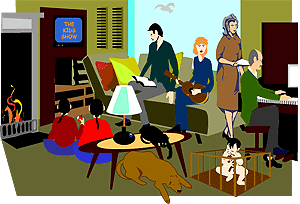| |
In order to do the exercises and activities in this lesson, you need to know the concepts explained in the reference tools listed here. Please review these sections. If you do not understand something, please ask your teacher.
Grammar & Structure:
In Unit 1 you learned about writing simple sentences about daily routine.
Example
Father plays the piano. Susan plays the guitar.
In this unit you will learn skills to help you write compound sentences: two sentences joined together to make one sentence.
Example
Father plays the piano, and Susan plays the guitar.
______________________
Using compound sentences will improve the level of your writing. In this Lesson you will use compound sentences to describe travelling.
Look at the following sentences:
Sarah took a bus to Toronto.
Susan flew to Vancouver.
Both sentences have a subject and a verb, so they are complete sentences. You can join the sentences together to make a compound sentence.
Sarah took a bus to Toronto, and Susan flew to Vancouver.
In this compound sentence, the two sentences are joined with the conjunction "and".
Compound sentences:
- are combined with certain conjunctions.
- use commas to separate the two simple sentences.
- use commas usually before the conjunction.
- use the conjunctions "and", "but", "yet", "or", "nor", "so", and "for" (each conjunction has its own function and shows the relationship between the two sentences: addition (more information), contrast (opposite information), choice, cause (reason), result. The following chart shows the function of each conjunction.)
- use a pronoun (I, you, he, she, it, we, they) if the subject is the same in both sentences.
Remember, a sentence with two subjects needs a plural verb.
Example
Maria and Jorge are on vacation, so they are in Mexico.
______________________
Conjunctions Table
| Function |
Conjunction |
Example |
| more information |
and |
Steve bought postcards, and information Jane bought a t-shirt. |
| choice |
or (positive) |
I think Joe visited Spain, or maybe he went to Italy. |
| nor (negative) |
Joe didn't go to Turkey, nor did he go to Greece. |
| opposite information |
but/yet |
Joe visited Spain, but John visited Victoria. |
| reason |
for |
John visited Victoria, for he thought it was beautiful. |
| result |
so |
The weather was bad, so the plane left late. |
|
|

 UNIT 2 — TRAVEL — Lesson 3A
UNIT 2 — TRAVEL — Lesson 3A